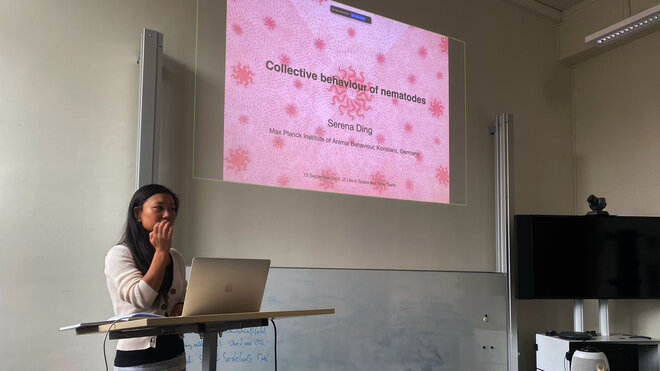Hosted by Pawel Romanczuk (HU)
Dr. Serena Ding
MPI of Animal Behavior - Genes and Behavior Research Group
Serena Ding is a Group Leader at the Max Planck Institute of Animal Behavior in Konstanz, Germany.
The Genes and Behavior Research Group studies the mechanism and evolution of several fascinating collective behaviors in nematode species including C. elegans. Since especially collective behavior, which is ubiquitous in the animal kingdom, is simply fascinating, they are investigating a number of exciting collective behavior that have recently been described and characterized in C. elegans and related nematode species. These include towering, wurmuration, and aggregation.
As an interdisciplinary team with combined expertise in quantitative behavior, neuroscience, molecular biology, evolutionary biology, statistical physics, and complex system modelling, they study the mechanism of collective behavior across the genetic, neuronal, and behavioral levels.
In her talk ‘Collective behaviour of nematodes’ Serena Ding will talked about how C. elegans has recently emerged as a model for several striking collective behaviours such as aggregation, wurmuration, and towering. Combining the powerful experimental accessibility of this major lab model organism with the knowledge that collective phenomena are widespread and highly relevant for many nematode species, they use quantitative behavior and behavioral ecology approaches to unravel the mechanism and the function of multiple collective behaviours in ecologically relevant nematode groups.



On September 13th, which noticeably felt like the onset of autumn, we were finally able to meet Serena Ding, who had made the long journey to Berlin from Konstanz, right on the border with Switzerland and not far from the small country of Liechtenstein. Most people probably only dealt with the subject of nematodes - also known as roundworms - in passing. But after Serena's presentation, some of us certainly fell in love with her and her model organism of interest as she took us into the hidden world of microscopic nematodes. Similar to ants, whose colonies, through their remarkable talent for self-organization, can take on unique forms and possess remarkable problem-solving abilities, nematodes are also capable of fascinating collective behaviors, especially under stressful conditions.
After her talk and a lively discussion, Pawel Romanczuk who had been looking forward to meeting Serena Ding for a while, invited her to meet his group to discuss the fascinating collective behavior C.elegans and other small nematodes exhibit in more detail. For lunch we met up at the local Italian restaurant Roma for pizza and pasta and enjoyed the delicious food at a cosy atmosphere. After lunch, Rüdiger Krahe welcomed Serena Ding into his group, which was a great pleasure for everyone.
Meeting Serena Ding and hearing about her passion for her work, but also about the struggles she faces as a young interdisciplinary group leader was inspiring and a gerat pleasure. We hope to stay in touch in the furture for further productive exchange and thank her wholeheartedly for the wonderful day.
